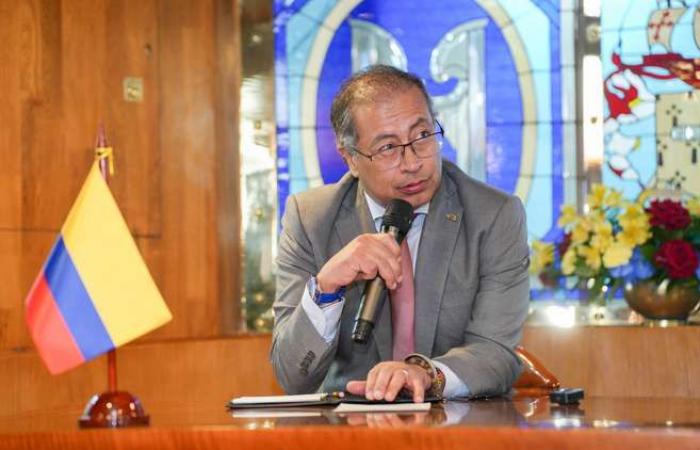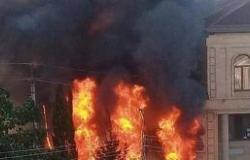President Gustavo Petro insisted on constituent power from Stockholm, Sweden.
Photo: Juan Diego Cano
President, in July you are going to the UN Security Council to denounce the Colombian State that you represent for its failure to implement the 2016 Peace Agreement. The former president and Nobel Peace Prize winner, Juan Manuel Santos, and even his allies They have been criticized for that. Do you maintain that idea? What are you looking for?
The peace process is being breached. The State is not just the Government. It is the Judicial, Legislative and, obviously, the Executive. I am head of state. But I am head of state only in international matters. For the rest, I have to respect the decisions of Congress and the Judiciary. And those decisions, including many of the Executive in these years that have passed since 2016, go against compliance with the Peace Agreement. Let’s take just one example: agrarian reform. The regulations for this agrarian reform were not changed, and with those that exist it has never been possible to carry out an agrarian reform. There is a failure to comply with agrarian reform, which is to collect fertile land and deliver it to the landless Colombian peasantry.
Isn’t all this an internal country debate?
The Agreement said three million hectares, we are going at 200,000. And why can’t the Government do more? Because you have to buy voluntarily from whoever offers it and they have not offered anything other than that. We could increase it to more than 400,000, but reaching three million with current regulations is undoubtedly impossible. And the rules are made by Congress. In the field of the Judiciary, things are being observed such as the suspension of the contracting of communal action with State resources. That means the peasant roads. There is no formula to comply with the Peace Agreement in excluded regions of Colombia. And now the agreed paths cannot be followed in the regions, which is only with their own popular organizations. A big businessman is not going to go into the jungles of Chocó and wait to be kidnapped. It is the community itself that goes and can do public works in its region with State money. Why aren’t they stopping themselves from doing that?
More information: Petro adjusts the governance strategy for the 782 days he has left in power
Do they put obstacles in the way of implementation?
That is failing to comply with the Peace Agreement, because one of those points speaks of the strengthening of popular organizations in the areas that were chosen as peace zones. And so we could name the judicial topic: judicial truth. In the Peace Agreement it was said that the body to close the judicial truth would be the Special Justice for Peace. And regulations and sentences over the course of all these years have prevented it. So, we are failing to comply with the Peace Agreement regarding judicial truth. In the case of the Executive, in the case of the governments, the Peace Agreement ordered that the excluded regions of Colombia be prioritized in public investment precisely to equalize them, to achieve convergence, so that they escape poverty and illicit economies.
His critics say there is a lack of political will…
If you look at the table of public investments from 2016 to date, which is found in the table of future validity that goes until 2030, public investment in Colombia has been concentrated in large private businesses, basically Transmilenio trunks and dual carriageways with tolls. , which are in a geography that is the wealthiest area of Colombia and not in the excluded regions where the Peace Agreement said that resources had to be invested. So, the governments have also failed to comply with the Peace Agreement regarding the inclusion of the territory excluded from Colombia.
It is of your interest: “The Government made the very serious mistake of promoting dissidence”: Santos
Are you looking for a kind of wink or international support to be able to pressure decisions here in Colombia, since, in your words, they are holding you back from failing to comply with that agreement?
Well, there is a commitment from Colombia to humanity, which is what Santos did; That’s not my invention. President Santos signed a letter saying that the Peace Agreement was a unilateral declaration of State. What does that mean? That humanity can complain to Colombia because it has not fulfilled the agreement. It is a Peace Agreement that he declared freely and voluntarily before the United Nations and that forms a kind of peremptory obligation. Declared non-compliance with the Agreement would undoubtedly have consequences. What I have proposed is precisely what one of the chapters of the unilateral declaration of State says, which is to make a national agreement to change the norms that are preventing the peace agreement in Colombia.
Are you going to talk about constituent?
No, that has nothing to do with it. That is a path of many. The law could do it, but the question is why it hasn’t. The law is not made by the Government. They could be judicial rulings in other cases, because they have come out adverse to the Peace Agreement. They can be acts of Government, and we are doing them to the best of our ability. They could be constitutional changes, which in my opinion there is no need to make many. But regarding the State’s public investment, yes, because the excluded territory has not been covered by current regulations and there is not really development in most of the excluded Colombia. Why doesn’t Petro do it? Because he needs the laws, he needs the norms, he needs the judicial decision to comply with the peace agreement with the FARC.
(“It is an allegiance to the side of war”: Petro canceled his trip to the summit in Switzerland)
*Editor’s note: this dialogue took place during the visit of President Gustavo Petro to Sweden within the framework of an expanded dialogue with the media that covered his tour, including El Espectador.






